These students are serious about Earth Day, and doing their part to protect the environment. They are committed to thinking and acting more sustainably.
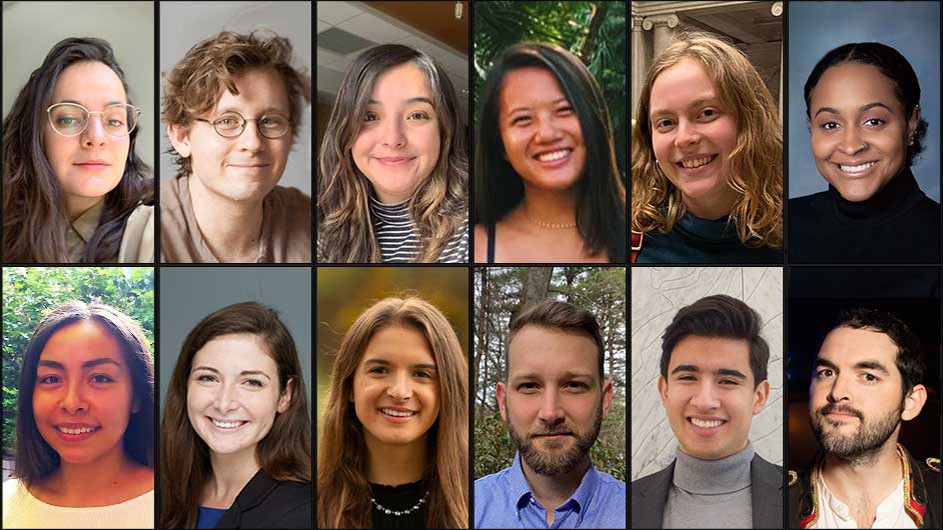
Last summer, President Lee C. Bollinger announced that Columbia University was opening a Climate School. In making that announcement, he noted there is already a "rich roster" of expertise, innovation, and research to build upon across the university in tackling the climate crisis.
The first class of Climate School students will start in the fall, but there are many students graduating this year who have spent years studying climate issues and sustainability efforts. That incoming class will be following in their worthy footsteps.
Columbia News reached out to 12 of those graduating undergraduates and graduate students to hear what they had to say about the degree they pursued at Columbia, the climate issues that most concern them, the people who inspired them, and how they hoped to use their degrees to take on one of the greatest threats facing humanity.
Sandra Aguilar Gómez
Ph.D. in Sustainable Development, SIPA
Mexico City, Mexico
Is there a defining public or private moment that led you to pursue your degree?
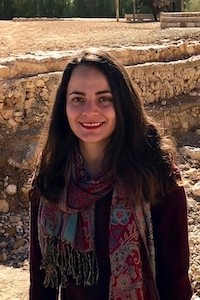
I recently found a diary from when I was a kid, in which I wrote that I wanted to do a master’s degree and a PhD when I grew up. During my childhood summers, I would ask my parents to invent research projects for me. I certainly was encouraged by my grandmother and parents, but I am not sure where I got this passion for research. I am the first PhD in my family, and the first to study outside of Mexico. I just always thought research questions were a fun mission.
The environmental focus of my research, however, is 100% inspired by my family. My father and brother are professional birdwatchers and conservationists, doing grassroots work in Mexico. My weekends growing up consisted of being surrounded by nature. While this was beautiful, I also witnessed firsthand the deterioration of our natural resources, and felt the urgency to address this problem. My family would visit a former lake that used to be an important ecosystem for many bird species. Last time we were there, it had lost more than half of its size. I felt that this was going unnoticed.
One of my current projects consists of using crowdsourced and satellite data to look at industrial overexploitation of water in Mexico. My interest in this project probably goes back to those family trips in which I noticed, with sadness, the magnitude of environmental degradation occurring around me.
Hayes Buchanan
Master of Science in Urban Planning, GSAPP
Atlanta, Georgia
What do you hope to do with your degree?
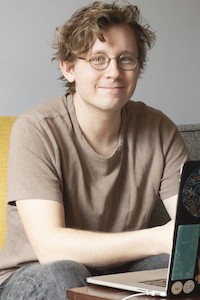
I would like to work on infrastructure provision and disaster risk management in developing nations. Moments of crisis are so often exploited by the powerful to enhance their control over marginalized groups and redistribute wealth upwards, and I want to be a part of rectifying that pattern. The Flint water crisis or the aftermath of Hurricane Katrina are prime examples of this form of disaster capitalism. It's an area where urban planners can center environmental justice, and provide a counterbalance to the default logic that protects the wealthy at the expense of everyone else.
Maria Castillo
Bachelor of Science in Earth and Environmental Engineering, SEAS
Laredo, Texas
Who do you admire and who has inspired you?
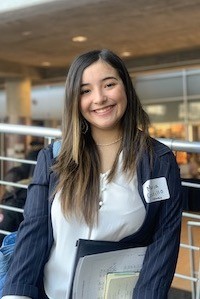
Dr. Melissa Lott, the current Director of Research at the Center on Global Energy Policy at SIPA is my biggest source of admiration in the climate space. Her work has done an amazing job to elucidate the intersections between public health, climate change, air pollution, and the energy transition and has demonstrated to me that climate work can be an effective pathway for improving the health and lives of marginalized people.
The work of Dr. Faye McNeill in the Chemical Engineering department was incredibly motivating to me and created a great example of harnessing the engineering space to improve air quality. She continues being a role model for me as someone dedicated to working to mitigate the effects of climate change through innovative atmospheric modeling.
Audrey Cheng
Bachelor of Science in Computer Science, CC
Superior, Colorado
What do you hope to do with your degree and who is someone you admire?
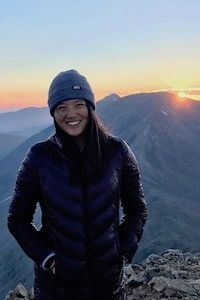
One of the reasons why I chose to major in Computer Science is because it can be applied to so many other fields, including sustainability. I hope to eventually work at this intersection; it really excites me how much potential there is in using technology to help solve environmental issues, such as predicting climate patterns, optimizing agricultural output, and improving clean energy access.
I will always be in awe of Greta Thunberg. Her courage, bravery, and passion for fighting climate change has been truly inspiring. She motivates me to be disciplined in making changes in my own lifestyle to reduce my carbon footprint. I especially admire her willingness to challenge world leaders and politicians, and I think she has increased awareness and given a voice to young people on the issue of climate change.
Eva Grunblatt
Bachelor of Science in Earth and Environmental Engineering, SEAS
Kingston, New York
Who is someone who motivated you to pursue your degree?
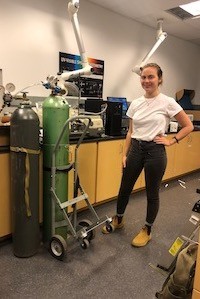
Professor Thanos Bourtsalas has been there for me since day one at Columbia. I started doing research with him my first month on campus and he’s been a great mentor to me ever since. He pushes students to work on projects of their particular interests and continues supporting students in whichever topic they may choose.
I hope to work on solid waste management after I graduate because I think this is a part of society that is vastly overlooked. Ultimately, I hope to improve products or policy to keep society moving toward green alternatives.
Courtney Jiggetts
Master of Arts in Climate and Society, GSAS
Clinton, Maryland
What's one climate change initiative you feel strongly about?
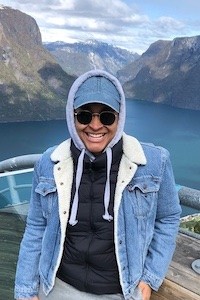
I have three. The first is carbon capture. If you can capture CO2 emissions in the atmosphere, we can mitigate warming. There are a lot of companies that have been doing some really interesting things to to capture carbon. For example, there's this one company, called Air Company, where they're capturing CO2 and turning it into ethanol and then ultimately into vodka. It’s the world's most sustainable vodka.
I'm also interested in ethnobotany, which is essentially the study of the relationship between plants and their medicinal or religious use. It stemmed from my class last semester with Brendan Buckley. We created a proposal for the end of the semester, and the route that I went down was reforestation and how cutting down trees releases CO2 and that we need to repopulate forest. But my interest lies in the plants and trees that we rely on tremendously for our medicines. What happens when these species die out or they can't adapt fast enough to climate change? Now we have a public health issue, because we're no longer able to produce a lot of the medicines that we rely so heavily on.
Lastly, of course, green cities. Creating green cities with net zero buildings is absolutely my paramount interest. If we plant more, we’ll have more tree and plant systems to retain and filter water. I want to create walkable cities so that we don't have to rely on cars for transportation.
Cecilia Magos
Master of Public Affairs in Environmental Science and Policy, SIPA
Cicero, Illinois
Is there a defining public or private moment that led you to pursue your degree?
I don't think it was one defining moment, it was more so of a combination of personal experience and public issues. My town where I grew up is a predominantly Latino community. You see all these things happening, like environmental injustice, but you don't realize it's that until you start to pay attention. It wasn't until I was in AmeriCorps that I started learning more about public health interventions and social determinants of health working with pregnant and parenting youth in Chicago, that it became more obvious. I was helping to empower young parents to be better versions of themselves, to take care of their child, and then I started noticing where they live: down the block from a factory or some other hazardous site. How can I possibly tell them that they're going to be okay when their environment says otherwise.
After AmeriCorps, I moved to New York City to work in the Bronx at a non-profit. They have very high asthma rates. It became more and more obvious that working on environmental justice issues was something that I wanted to pursue. Because my degree is a combination of both science and policy work, I hope to be able to work somewhere in between the two. I feel like when we're talking about climate change, it's always about energy and renewables. How can we incorporate health more into the conversation of energy transition?
Shannon Marcoux
Juris Doctor, Law School
Milwaukee, Wisconsin
Who motivated you to pursue your degree?
Gulika Reddy, who teaches in the Human Rights Clinic at the Law School, has consistently shown me the possibility and importance of interdisciplinary human rights work. There is an unfortunate phenomenon of siloing in the legal field, but Gulika continually pushed me—through her advice, her teaching, and her example—to think creatively as a human rights advocate about how I could create a career path in between the silos. Even though Gulika does not work on climate issues herself, she helped me see that a career in human rights advocacy with a climate focus was possible.
It is not possible to talk about climate change law at Columbia without mentioning Professor Michael Gerrard, who has taught me pretty much everything I know about climate change law and policy. His experience in the Marshall Islands was invaluable for my own research on the impact of U.S. militarism on human rights in the Marshall Islands.
More important for my education in climate law is that he teaches his climate courses through the lens of climate justice, never forgetting who is on the front lines of this crisis. Given that my experience in the Micronesian region catalyzed my pursuit of a career in climate justice, I have so appreciated having a professor, advisor, and supervisor who shares a deep appreciation and love for the region, as well as a desire to fight for it to remain habitable.
Arianna Menzelos
Bachelor of Arts in Sustainable Development, CC
Los Angeles County, California
What's one climate change initiative you feel strongly about and why?
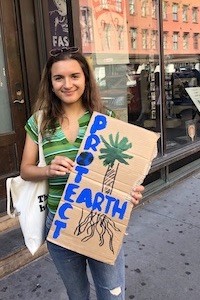
I’d love to see a nationwide clean electricity standard because I think it’s a key to meeting emissions-reductions goals. We need to electrify a lot, essentially setting targets for utility generation. For example, many have endorsed a 100% clean electricity standard by 2035. Decarbonization is about more than how we turn on the lights. It includes transportation, and buildings, and industry.
I hope to work in D.C. after graduation. I want to go back to graduate school, eventually, to continue exploring the different sides of climate that I haven’t had a chance to yet. I've been engaged in the energy side but would also like to learn more about different sectors, like agriculture.
Bradford Parker
Masters of Science in Sustainability Management, SPS
Frederick, Maryland
Is there a defining public or private moment that led you to pursue your degree?
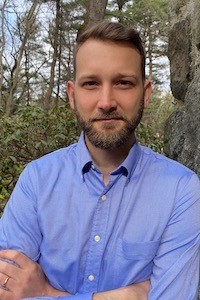
This is going to sound a little corny, but I was a medic in the U.S. Army, and, a big part of our training and our day-to-day life is the concept of triage, particularly battlefield triage, which requires you to enter a crisis scene, make a number of assessments based on the type and severity of injuries. Then most crucially, you need to identify what resources you have to treat those injuries and how you can most effectively spread them out to do the most good.
I really liked that concept. It makes sense because it's a very methodical approach. It's a great way to act in a crisis, breaking things down to very simple levels. I think to me the work of sustainability mirrors this and represents a very similar structure: we have a climate crisis, and we're making assessments and calculations necessary to do the most good with what limited resources we have. If I want to continue the metaphor I could say that we're stemming the bleeding of carbon emissions and we're applying splints to our broken infrastructure. Coming out of the Army, and getting a degree at Columbia, I saw that I wanted to continue this methodical look at doing the most good for the most people, and sustainability just really clicked with me.
Anthony Luis Perez
Bachelor of Arts in Sustainable Development, CC
Fresno, California
What's one climate change initiative you feel strongly about and why?
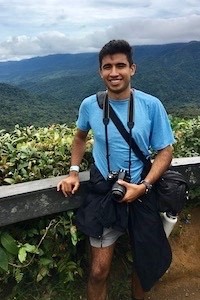
Over the winter, I did this workshop on sustainable development in a team of five seniors. We were focusing on climate adaptation finance and planning for PIermont, New York. It’s a really small community that’s outside of New York City, about a 30-minute drive right alongside the Hudson River, with a population of about 2,500 people. Chaumont is strapped for resources because it’s a small village and it doesn't have a lot of extra revenue to devote to infrastructure projects to protect it from flooding. And that’s one of the biggest issues that’s sort of under the surface. We’re not really talking about flooding as a national issue and just from being exposed to this project and trying to find solutions and financing for large-scale infrastructure projects to protect the community, we realized that there’s a lack of federal, state, and private money for communities like Chaumont. Sea-level rise and flooding are becoming big issues for communities around the world. Just look at Hurricane Sandy in 2012, which devastated many communities on the East coast. It's a pressing problem and not a lot of people are talking about it.
Rollie Williams
Master of Arts in Climate and Society, GSAS
Golden, Colorado
Is there a defining public or private moment that led you to pursue your degree?
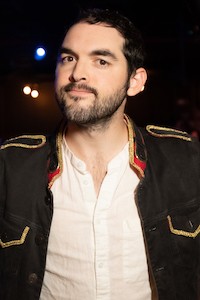
I had been performing comedy in New York for a few years when I had an idea for a comedy show, "An Inconvenient Talk Show," which I would host in character as a strung-out former Vice President Al Gore. Every episode would feature a bunch of comedians and a real climate scientist or journalist. The show was picked up by Caveat Theater in Manhattan.
After about a year of interviewing scientists and writing comedy about climate change, I realized that I needed to spend less time on other projects and more time trying to communicate the climate crisis to people who weren’t explicitly seeking out the information. The next week, I quit my job and applied to Columbia. The week after that, I realized Columbia wouldn’t start for several months and that quitting my job was maybe not the best idea, but sometimes you have to make a decision and then make it work.
My goal is to create a mainstream comedy television show that focuses on climate change—something like The Daily Show or Last Week Tonight, except every episode is tied to the climate crisis. More than anything, it needs to be really funny.




0 Comments
please do not spam link